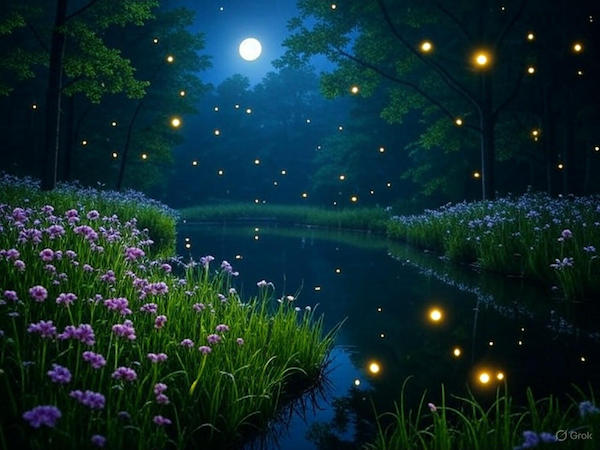
I do not pretend to understand any of the mathematics behind Quantum Physics. After all, I am just a plodding grease monkey and high school dropout; the mathematics of quantum physics is as foreign to me as a distant galaxy. Yet, despite my educational limits, I find myself captivated by its mysteries. Quantum theory, with its strange particles and unseen realms, offers a glimpse into the origins of our universe and what keeps it humming. It's a puzzle that sparks scientific curiosity and spiritual wonder, inviting us to ask: What lies beneath it all?
Picture a dark summer night, alive with fireflies. Their tiny lights blink on and off, appearing and vanishing in seemingly random patterns. You can't predict where the next glow will flare or when it will fade. Now, imagine this as a metaphor for the subatomic world. Quantum theory reveals a restless quantum vacuum—not space, but a sea of energy where particles, like quarks, electrons, and others, flicker into existence for a fleeting moment before dissolving back into the void. These quantum sparks are the fireflies of the cosmos, dancing in a realm too small for our eyes to see.
But this isn't just about particles. The fireflies remind us that what seems random may be part of a larger tapestry. Just as the darkness hides the fireflies' paths, the quantum vacuum conceals the forces shaping our universe. As you can imagine, things can get very weird at the subatomic level. — "For my thoughts are not your thoughts, neither are your ways my ways, saith the Lord."— Isaiah 55:8
So, what is this quantum vacuum? Is it merely a physical dimension, too alien for our senses to grasp? Or could it be something more—a glimpse of the divine? I wonder if these fleeting particles are moments where the eternal touches the temporal, like a cosmic maintenance crew sustaining the universe since the Big Bang. The idea feels profound whether you call it the mind of God, a higher power, or the source of all being. Could it be that this quantum dance is the heartbeat of creation itself? It is a dance that feels eternal, but is it? If the universe really exists within the mind of God, humanity, with all our flaws, has given the Him plenty of reasons to flush us back into the void. Yet, the particles keep flickering, and the cosmos endures.
For me, this persistence hints at a purpose beyond our understanding, a mystery that science and spirituality both seek to unravel. As Pilate asked, "What is truth?" (John 18:38). For me, a Christian, the answer lies in Jesus, who said, "I am the way, the truth, and the life" (John 14:6)
Science has illuminated the mechanics of the quantum world, from quarks to black holes, with breathtaking precision. But there's a dark shadow to this brilliance — scientism, the belief that only measurable, testable knowledge counts. Scientism dismisses theological, ethical, or aesthetic insights as mere fantasy, as if the human spirit can be reduced to equations. A materialist might argue that science alone, with its empirical evidence, unlocks reality. That's true enough on one level, but is it enough? Mathematics without context becomes a pretext. Without imagination, it is a useless tool. As Pope John Paul II once said, "Looking for scientific evidence for the eternal realm is like taking apart an alarm clock to look for time."
I see no clash between science and spirituality. Science maps the how; spirituality ponders the why. Quantum physics, with its flickering particles, picks up where the Book of Genesis left off, echoing those ancient words: "Let there be light!" Together, they weave a richer story of existence, one that invites anyone who has a speck of spirituality to marvel at the mystery.
For centuries, metaphors like fireflies or Genesis have helped ordinary folks like me grapple with the universe's grandeur. Quantum theory, for all its complexity, is another chapter in that story. It doesn't demand we choose between test tubes and faith but beckons us to wonder: Are we glimpsing the mind of the divine in those quantum sparks? I don't have the answers, but I find contentment in the firefly's dance revealing what nature's darkness hides, and from the spiritual light of an even greater darkness that lies behind nature — pointing us toward truth.
Dan Stewart












